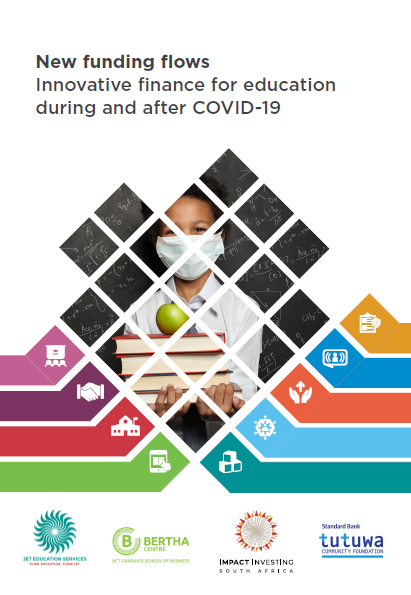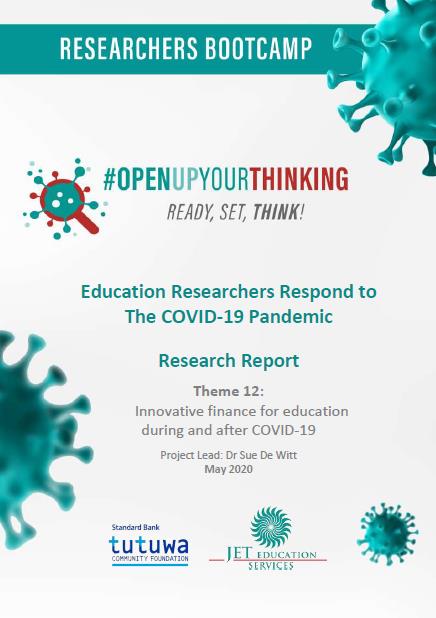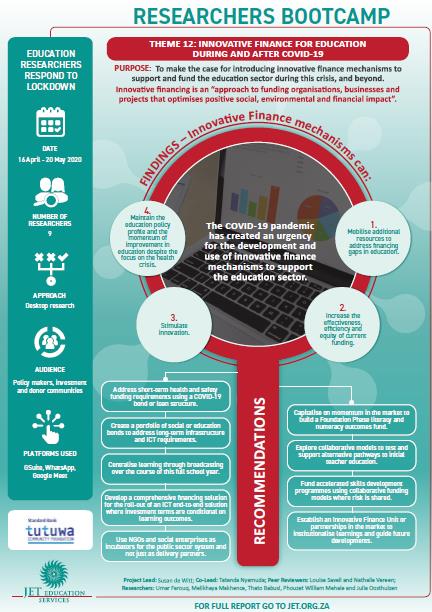Theme 12: Innovative Finance for Education
Lead Researcher: Associate Professor Lee Rusznyak, University of the Witwatersrand (Wits)
Conceptualised by: Nadine Petersen, University of Johannesburg (UJ), Maureen Robinson (SU), Stellenbosch University, Carisma Nel, North West University (NWU), Carol Bertram, University of KwaZulu Natal (UKZN), Jackie Batchelor, University of Johannesburg, Moeniera Moosa, University of Witwatersrand, Tanya Bekker, University of Witwatersrand, Sarita Ramasroop, University of Johannesburg, Jacques Du Plessis, University of Witwatersrand, Dale Langsford. University of Witwatersrand, Emmanuel Mushayikwa, University of Witwatersrand
With valuable input from: Michelle Mathey, (DHET), Ella Mokgalane, (SACE), Francis Faller, University of Witwatersrand, Karl Maton, University of Sydney, Elizabeth Walton, University of Nottingham, Hilda Israel and Andries Du Plessis, University of Mpumalanga, Mari van Wyk, University of KwaZulu Natal, Georina Westraadt. (TOGI), Heloise Sathorar, Nelson Mandela Metropolitan University (NMMU), Lise Westaway, Rhodes University, Zelda Barends, Stellenbosch University
Read the report published by JET and UCT GSB Bertha Centre for Social Innovation and Entrepreneurship with support from the Tutwa Foundation and Impact Investing South Africa: New funding flows: Innovative finance for education during and after COVID-19 |
Download the background report and infographic
Background
The South African education system comprises three distinct components of provision: Early Childhood Development (ECD); basic education; and post-school education and training (PSET). The three components of the education system are each funded through separate funding channels. Basic Education is a concurrent function which means it is jointly funded by the National Department of Basic Education and the provincial departments of education. Similarly, ECD is jointly funded by the National Department of Social Development and the provincial departments of social development. On the other hand, PSET is a national function and is therefore exclusively funded by the Department of Higher Education and Training (DHET).
The state dedicates significant financial resources to education, with the education budget being substantially higher than the budgets for any other funded government function. In the face of substantial fiscal pressure, the government has been able to protect expenditure in this sector. Over the presented period, total government expenditure has grown at an average annual rate of 6.9% - below the growth of PSET (16.6%), Basic Education (7.2%) and ECD (11.5%). This implies that education’s proportion of public expenditure has not only been protected but has actually increased over the last four years.
Objectives of research
The purpose of this research is to investigate the use of innovative funding mechanisms that can be used to address short, medium and long term funding needs in the public education sector during and in the aftermath of COVID19. This research can be used to make recommendations to the government and private sector on how they can allocate capital to maintain and improve educational outcomes.
Research questions
- What are the short, medium and long term funding needs?
- How can innovative finance solutions be applied to these needs?
- Who/how would be required to action these recommendations?
Project Deliverables
- Investigate alternative funding models
- Evaluate funding model against the needs
Segment system as follows:
- Subsector
- Short, medium, long term
- Current funding structure
- Identify needs in each segment
Develop a set of criteria against which innovative funding model can be applied
- Source of funding
- Timeframe to implementation
- Stakeholder roles and responsibilities
- Complexity of solution



